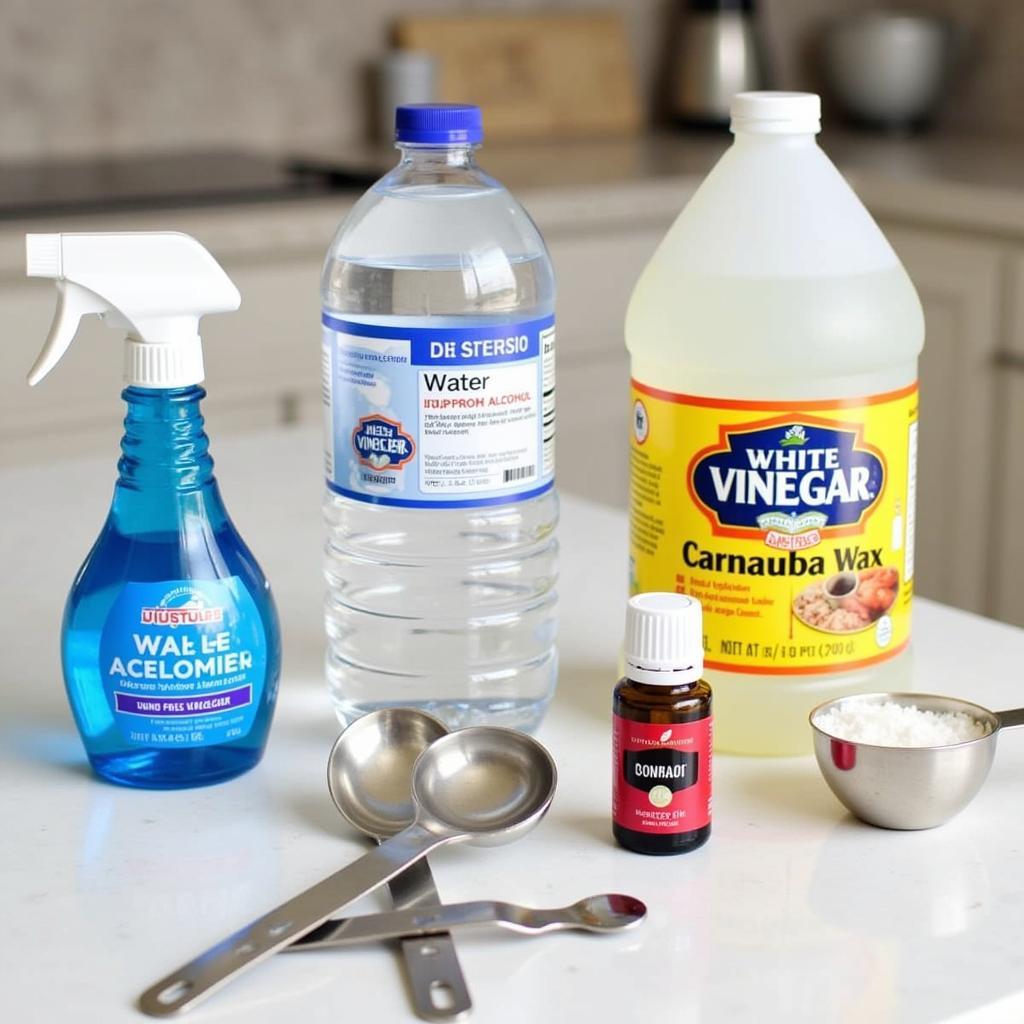Homemade Car Detail Spray is a cost-effective and environmentally friendly way to keep your car looking its best. Whether you’re a seasoned detailer or just looking for a quick and easy way to enhance your car’s shine, a DIY spray can be the perfect solution. This article will guide you through creating your own effective car detail sprays, discuss the benefits, and offer tips for achieving professional-level results.
Why Choose a Homemade Car Detail Spray?
Many commercial car detail sprays contain harsh chemicals that can damage your car’s paint over time. By making your own, you control the ingredients, ensuring a gentle yet effective cleaning process. Plus, it’s significantly cheaper than buying pre-made products, allowing you to detail your car more frequently without breaking the bank. Creating your own customized blend also allows you to cater to your car’s specific needs, whether it’s removing water spots, enhancing gloss, or protecting against UV rays.
Simple and Effective Homemade Car Detail Spray Recipes
Here are a few tried-and-tested recipes for creating your own car detail spray at home:
1. The Basic Quick Detailer: This simple recipe is perfect for a quick shine and dust removal.
- 1 cup distilled water
- 1/2 cup isopropyl alcohol (70%)
- 1 tablespoon white vinegar
- A few drops of your favorite car wash soap (optional)
Combine all ingredients in a spray bottle and shake well.
2. The Gloss-Enhancing Spray: For a deeper shine and added protection:
- 1 cup distilled water
- 1/4 cup isopropyl alcohol (70%)
- 2 tablespoons carnauba wax (liquid or paste, melted if necessary)
- A few drops of essential oils for fragrance (optional)
Mix thoroughly and ensure the carnauba wax is fully emulsified before use.
3. The Water Spot Remover: Hard water can leave unsightly spots on your car’s finish. This spray helps combat that:
- 1 cup distilled water
- 1/4 cup white vinegar
Mix and apply directly to the affected areas, wiping clean with a microfiber towel.
 Homemade Car Detail Spray Ingredients
Homemade Car Detail Spray Ingredients
Applying Your Homemade Car Detail Spray
For best results, wash and dry your car before applying your homemade detail spray. Spray a light mist onto a section of your car’s paintwork and immediately wipe with a clean microfiber towel. Work in small sections, overlapping slightly to ensure complete coverage. Don’t let the spray dry on the surface, as this can leave streaks.
Tips for Professional Results
- Always use distilled water to avoid mineral deposits.
- Invest in high-quality microfiber towels to minimize scratching.
- Store your homemade spray in a cool, dark place.
- Test your spray on a small, inconspicuous area of your car first to ensure compatibility.
Common Mistakes to Avoid
- Using tap water instead of distilled water can lead to water spots.
- Applying too much spray at once can cause streaking.
- Using abrasive cloths can scratch your car’s paint.
- Not shaking the bottle before use can result in uneven application.
How Often Should You Use a Homemade Car Detail Spray?
Depending on your environment and driving habits, you can use your homemade detail spray between washes, typically once or twice a week, to maintain your car’s shine and protect its paintwork.
Conclusion
Homemade car detail spray offers a simple, affordable, and effective way to keep your car looking showroom-ready. With a few readily available ingredients, you can create a customized spray tailored to your car’s needs, achieving professional results without the hefty price tag. By following the recipes and tips outlined in this article, you can enjoy a sparkling clean and protected car for years to come. Start making your own homemade car detail spray today and experience the difference!
FAQ
-
Can I use any type of vinegar? White vinegar is recommended for its cleaning properties and mild acidity.
-
Is isopropyl alcohol necessary? It helps the spray dry quickly and prevents streaking.
-
How long does homemade car detail spray last? It’s best to use it within a few weeks for optimal effectiveness.
-
Can I add fragrance to my spray? Yes, a few drops of essential oils can add a pleasant scent.
-
What if I don’t have carnauba wax? You can omit it or try using a small amount of beeswax.
-
Can I use this spray on all car surfaces? Test it on a small area first, but it’s generally safe for paintwork, glass, and chrome.
-
How can I prevent streaking? Use a clean microfiber towel and work in small sections, wiping immediately after spraying.
For further information on car care and detailing, explore other articles on our website like “Choosing the Right Car Wash Soap” and “The Ultimate Guide to Paint Correction.”
Need expert advice? Contact us via WhatsApp: +1(641)206-8880, or Email: [email protected]. Our 24/7 customer support team is ready to assist you.

Leave a Reply